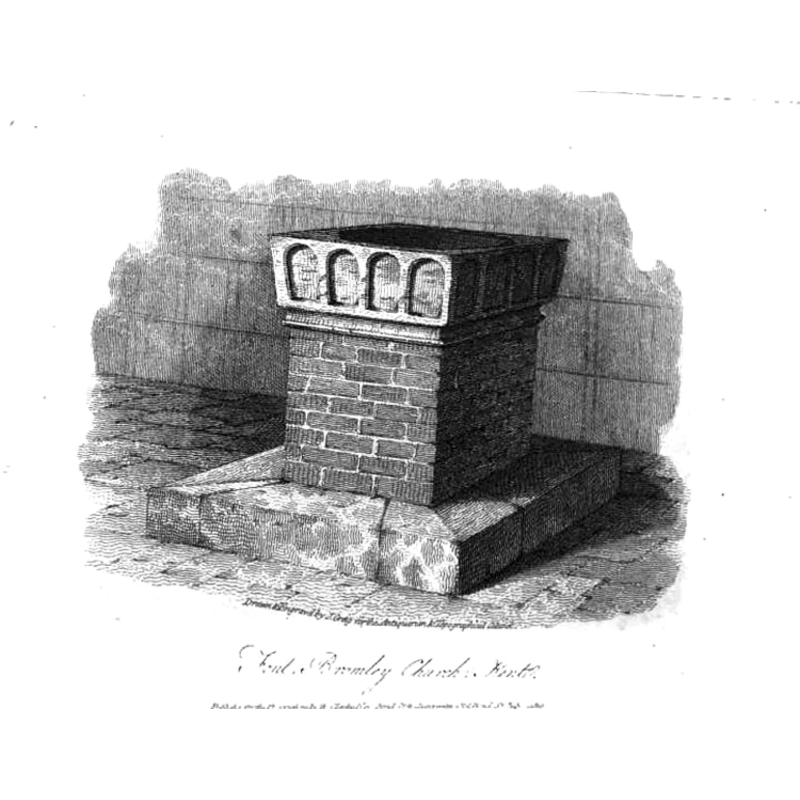Bromley

Image copyright © [in the public domain]
PD
Results: 3 records
B01: design element - architectural - arcade - blind - round arches - 16 arches
BBL01: design element - motifs - scotia
INFORMATION
Font ID: 06876BRO
Object Type: Baptismal Font1
Font Century and Period/Style: 12th century [basin only], Medieval [composite]
Cognate Fonts: The font at Woodchurch, also in Kent , is made of black 'marble' as well
Church / Chapel Name: Parish Church of St. Peter and St. Paul
Font Location in Church: Inside the church
Church Patron Saint(s): St. Peter & St. Paul
Site Location: Greater London, South East, England, United Kingdom
Directions to Site: Formerly in Kent, Bromley is now one of the largest boroughs of London
Historical Region: formerly Kent
Additional Comments: altered font: modern base
Font Notes:
Click to view
Noted in 'The environs of London' (1796): "The font is square; of Norman architecture; the sides are ornamented with rows of plain circular arches". Noted and illustrated in Storer (1807-1811), with an engraving by John Greig, where the square basin appears raised on a broad quadrangular base made of bricks, and a stone plinth of the same shape: "The Font, which is an excavated block of Purbeck, is elevated by brick-work, and bears undoubted evidence of its high antiquity, the basin is hollowed to a size sufficiently large for emersion [sic]. The Font is nearly square, the upper portion being rather larger than the lower, and the sides are ornamented with the plain semicircular arches of the Norman architecture." Lewis' Dictionary of 1848 reports simply "an ancient Norman font" in this church. Referred to in Hone (1827) as an "old Norman font". Described in Glynne (1877): "The font is early, of square form, and of black marble, moulded with plain circular arches. The pedestal is modern." Described in Cox & Harvey (1907) as a baptismal font of the Norman period made of black marble. In Newman (1980): "Font. Norman, on a modern base that does not fit. Square marble bowl, with four shallow sunk arches per side."
MEDIUM AND MEASUREMENTS
Material: stone, marble (black)
Font Shape: square, mounted
Basin Interior Shape: round
Basin Exterior Shape: square
REFERENCES
- Victoria County History [online], University of London, 1993-. URL: https://www.british-history.ac.uk.
- Assunção, Fernando, Etopeya y tragedia de Manuel Lobo: biografía del fundador de Colonia del Sacramento (1635-1683), Montevideo: Linardi y Risso, 2003, [www.british-history.ac.uk/report.asp?compid=50834] [accessed 22 January 2007]
- Cox, John Charles, English Church Furniture, New York: E.P. Dutton & Co., 1907, p. 203, 204
- Glynne, Steven Richard, Sir, Notes on the churches of Kent, London: John Murray, 1877, p. 272
- Hone, William, The table book: cuttings with cuts, facts, fancies [...], London: Published for William Hone by Hunt and Clarke, York Street, Covent Garden, 1827, p. 465
- Newman, John, West Kent and the Weald, Harmondsworth: Penguin Books, 1980, p. 183
- Storer, James Sargant, The Antiquarian and Topographical cabinet; containing a series of elegant views of the most interesting objects of curiosity in Great Britain, London: Published for the proprietors by W. Clarke, 1807-1811, vol. 8: [unpaged; entry for Bromley Church]